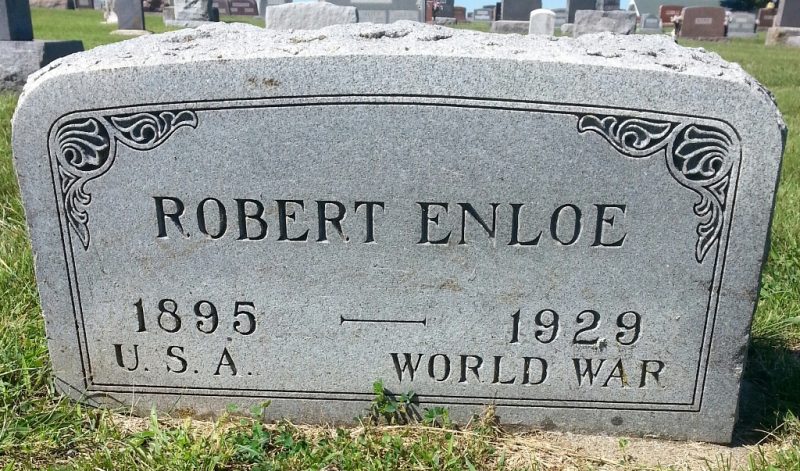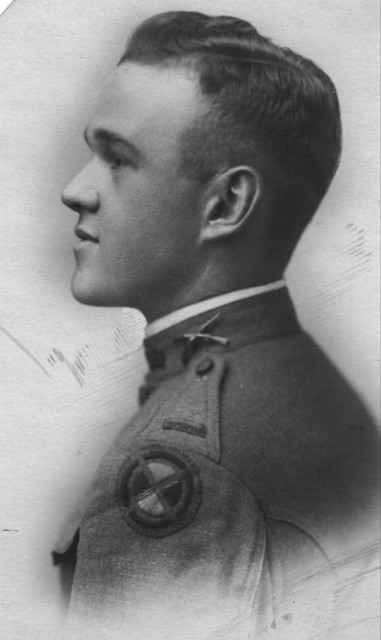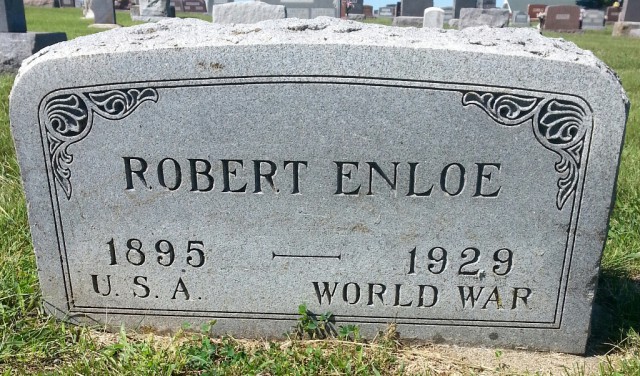
Death of Jefferson City twins serves as reminder of WWI sacrifices
By Jeremy P. Amick
With an estimated 4.5 million Americans serving in uniform during World War I, many parents contributed to the war effort by sending their offspring overseas, often resulting in the tragedy of the child’s life sacrificed in the fight for freedom.

Such loss weighed heavily upon one Cole County family who not only forfeited the life of a son in combat, but also experienced similar tragedy eleven years after the war. Raised in the Jefferson City area, Roscoe and Robert Enloe were the twin sons of Dr. Isaac Newton Enloe, who—as noted in his obituary—was considered “one of the most prominent practitioners in Central Missouri …” Very little information exists regarding the Enloe twins and their service during the war, but archival sources do expose the depressing litany of hardships the family would come to endure.
On September 29, 1918, both Roscoe and Robert were serving with Company C, 130th Machine Battalion (a Missouri National Guard company mobilized for federal service during WWI) in France, when death first approached. According to a letter Robert wrote home to his father (a copy of which was later published in The Journal of the Missouri State Medical Association), Roscoe was behind one of the unit’s machine guns when a German machine gun opened fire and shot him through the right lung.

As Robert explained, “I carried him back about twenty feet, laid him down on the ground and did what I could for him, using all my first aid packet.” Later that evening, Roscoe passed away and was laid to rest in the Meuse-Argonne American Cemetery in Romagne, France. Records obtained from the Missouri Digital Heritage site indicate that Robert later served with the 815th Pioneer Infantry Regiment until July 29, 1919, with whom he received appointment to the rank of second lieutenant.
Newspaper snippets reveal that after the war, Robert returned to Missouri and was later married. In March 1925, he and his wife became the proud parents of a son while living in Rawlins, Wyoming. Yet the delights of fatherhood and family life would come to an end in just a few years while Enloe and his younger brother Justin were living in Tulsa, Okla., where they were employed by the Shell Oil Company. As reported in the October 28, 1929 edition of the Jefferson City Post-Tribune, Robert was in “extremely critical” condition after borrowing a .45 caliber revolver to “dispatch a dog.” As the article noted, he was “handing the gun back to the owner when it was discharged,” causing the bullet to become lodged in his stomach.
Robert’s older brother, Dr. L. David Enloe—a Jefferson City resident, physician and also a World War I veteran—left home to visit his brother, reporting to the newspaper on November 2, 1929 that his conditon “is greatly improved,” however, still “far from safe.” During the next several days, Jefferson City newspapers continued to report the improvements and relapses Robert experienced, but on November 8, 1929, the 34-year-old succumbed to the wound, leaving behind a wife and a young son.
Robert’s remains were returned to Mid-Missouri and laid to rest in Enloe Cemetery west of Russellville, near the grave of his parents (who preceded him in death) and the honorary marker dedicated to the WWI sacrfice of his twin brother. Though all that remains of Robert’s service to the nation is an unadorned marker hidden among hundreds of larger stones, the memory of his family perseveres through naming of the Roscoe Enloe American Legion Post 5 in Jefferson City.
While this account highlights twin brothers who met a similar, depressing fate, it is more importantly the narrative of a family who gave much in the cause of freedom and whose loss and sacrifice did not end with an armistice.
Veterans Day may have come and gone, yet Enloe’s story beckons us to preserve the memories of our military members, past and present.
It serves as a reminder of those who have given much in the cause of freedom and choose do so without hesitation or in search of reward, often leaving behind nothing more than a simple granite marker as the only testament of their gift to a nation.
Jeremy P. Amick is the public affairs officer for the Silver Star Families of America.
Jeremy P. Amick
Public Affairs Officer
Silver Star Families of America
www.silverstarfamilies.org
Cell: (573) 230-7456